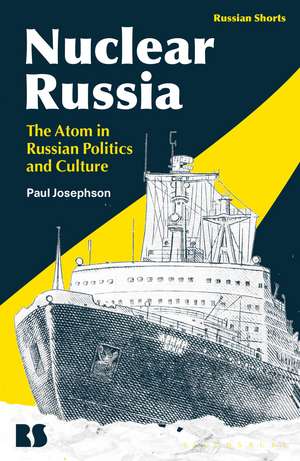Nuclear Russia: The Atom in Russian Politics and Culture: Russian Shorts
Autor Professor Paul Josephsonen Limba Engleză Paperback – 28 dec 2022
| Toate formatele și edițiile | Preț | Express |
|---|---|---|
| Paperback (1) | 83.65 lei 3-5 săpt. | +10.50 lei 6-12 zile |
| Bloomsbury Publishing – 28 dec 2022 | 83.65 lei 3-5 săpt. | +10.50 lei 6-12 zile |
| Hardback (1) | 316.98 lei 6-8 săpt. | |
| Bloomsbury Publishing – 28 dec 2022 | 316.98 lei 6-8 săpt. |
Preț: 83.65 lei
Preț vechi: 92.30 lei
-9% Nou
Puncte Express: 125
Preț estimativ în valută:
16.01€ • 17.12$ • 13.35£
16.01€ • 17.12$ • 13.35£
Carte disponibilă
Livrare economică 27 martie-10 aprilie
Livrare express 12-18 martie pentru 20.49 lei
Preluare comenzi: 021 569.72.76
Specificații
ISBN-13: 9781350272552
ISBN-10: 1350272558
Pagini: 160
Ilustrații: 14 bw illus
Dimensiuni: 129 x 198 x 22 mm
Greutate: 0.05 kg
Editura: Bloomsbury Publishing
Colecția Bloomsbury Academic
Seria Russian Shorts
Locul publicării:London, United Kingdom
ISBN-10: 1350272558
Pagini: 160
Ilustrații: 14 bw illus
Dimensiuni: 129 x 198 x 22 mm
Greutate: 0.05 kg
Editura: Bloomsbury Publishing
Colecția Bloomsbury Academic
Seria Russian Shorts
Locul publicării:London, United Kingdom
Caracteristici
Blends aspects of history of science and technology, political and cultural history, and environmental history
Notă biografică
Paul R. Josephson is Professor of History at Colby College, USA. He is the author of twelve books, including Traffic (Bloomsbury, 2017), Fish Sticks, Sports Bras, and Aluminum Cans (2015), The Conquest of the Russian Arctic (2014), Lenin's Laureate: A Life in Communist Science (2010), Would Trotsky Wear a Bluetooth? Technological Utopianism Under Socialism (2009), and Motorized Obsession: Life, Liberty and the Small Bore Engine (2007).
Cuprins
List of Illustrations1. Nuclear Bolshevism2. Nuclear Defense3. Nuclear Peace4. Nuclear Hubris5. Nuclear Disintegration6. Nuclear RenaissanceIndex
Recenzii
The nuclear complex of Russia has not come to an end, to the contrary: its military and civilian arms continue to expand threating both the global political order and the environment. Nuclear Russia unfolds the entangled history of this socio-technical complex from the February Revolution of 1917 to the present, its knowledge and engineering orders, nuclear warheads and military facilities, actors and reactors, and above all its political, economic, environmental and cultural ramifications. This most timely book is a great pleasure to read.
One can hardly imagine a better guide to Russian nuclear power than Paul R. Josephson. Attention to Ukraine is particularly welcome in the wake of Russia's devastating invasion and attendant risk of nuclear disaster.
One can hardly imagine a better guide to Russian nuclear power than Paul R. Josephson. Attention to Ukraine is particularly welcome in the wake of Russia's devastating invasion and attendant risk of nuclear disaster.















